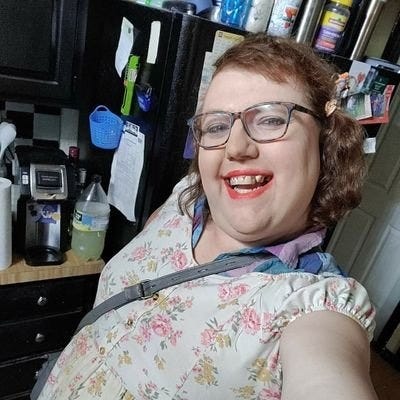
Stephanie Todd
Dishes, check. Laundry, check. Take out the trash, check. Each day, Stephanie Todd meticulously budgets her time and energy to accomplish basic chores around the house.
Todd has chronic pain from a myriad of physical disabilities and illnesses that make it difficult to walk or work full time. The 42-year-old makes around $270 a month and relies on crowdfunding to meet the rest of her monthly expenses.
Compounding her health complications, Todd is also a transgender woman living in Idaho who relies on Medicaid in a state that has banned public funds from covering gender affirming care. It means Todd asks on Bluesky for donations via Venmo to cover her daily expenses and to raise money for her medical transition.
“I am absolutely dependent on donations from strangers to meet my day-to-day medical needs, because my paycheck isn’t sufficient and the food stamps don’t cover medications,” Todd said.
Although there aren’t nationwide numbers on transgender people who crowdfund for medical expenses, a study published by the American Public Health Association shows that transgender people are more likely to be uninsured and face barriers to accessing quality medical care. Todd is worried about the future and what potential Medicaid cuts might mean for her financial situation.
“I already got a text from the pharmacy with a bill for a med that should have been covered,” said Todd. “I’m already facing an uncertain situation today.”
Barriers to healthcare access
Todd said she faces cost barriers and discrimination when trying to access healthcare.
“It’s not just difficult getting gender affirming care. It’s difficult just getting basic healthcare in Idaho,” Todd said, adding that sometimes pharmacists have refused to refill her prescription for hormones.
“A lot of healthcare providers and pharmacies and urgent care places refuse to even provide medical care at all, of any nature, to trans people due to supposed religious objections,” Todd said. The Medical Ethics Defense Act, signed into law on March 19, 2025, allows healthcare providers in Idaho to deny patients procedures, prescriptions, and services based on moral, ethical, or religious beliefs.
Todd has a permanently broken foot, neuropathy in her legs, carpal tunnel syndrome in both hands, and gastroparesis, which requires her to see multiple specialists to address all her health conditions. Even if her physicians are supportive of transgender people, doctors sometimes have to navigate the legal minefield of providing gender affirming care in Idaho.
“Doctors in Idaho have to get creative in how they prescribe things in order to still be able to bill Medicaid,” Todd said. House Bill 668 restricts the use of public funds for gender affirming medical care for someone’s transition. Passed on March 27, 2024, the law makes it illegal for transgender people like Todd to use their Medicaid insurance to pay for hormones or gender affirming surgery.
Other procedures that Todd is seeking, from bottom surgery and breast augmentation to laser hair removal, are not cheap and can cost, on average, tens of thousands of dollars without health insurance coverage, per a study published in the Journal of Law, Medicine, & Ethics.
Relying on mutual aid
Todd lives with a friend for free and works as a caregiver for an autistic adult once a week for 12 hours, earning her about $135 every two weeks. It’s not enough to cover her bills, but because of her physical disabilities, she cannot seek other work.
“Walking is incredibly painful,” Todd said of her permanently broken foot. “My foot pain is about an 8 to a 9 on the pain chart every day, all day, it never goes away.”
She can’t afford the things she needs, like orthopedic shoes, and asks her community to donate to meet her daily needs. Her costs per day run roughly $35 to purchase lidocaine and ibuprofen for pain, a diet of protein shakes and Gatorade that won’t trigger her gastroparesis, and her hormone replacement therapy of estradiol.
“I personally have been pretty effective at crowdfunding for myself and for other trans women,” Todd said of her social media outreach. “I am well connected with supportive people who have a big, massive reach who care about trans issues.”
One of those people is DC and Marvel comic book writer Gail Simone. Todd said she has asked Simone for her help amplifying other trans women’s GoFundMe pages to her hundreds of thousands of followers, and Simone has always obliged.
But for Todd and other transgender people publicly asking for help, there’s a delicate balance between the power and danger of visibility online. She said she’s been harassed online by users on 4chan, an anonymous platform.
Regardless of the risks, Todd is out and proud and wants to speak up about “the institutional transphobia that causes a lot of real, tangible hardships” in her community. 2025 is the fifth year in a row that a record-breaking number of anti-transgender laws are being considered and passed, many of them pertaining to restricting access to healthcare, per the Trans Legislation Tracker.
It’s important to Todd to explain to the public why she prioritizes her gender transition alongside all her other hardships.
“A lot of my complications go above and beyond just being trans and poor in a red state,” Todd said. She said there’s the constant trauma she experienced alongside her peers, of being rejected and shunned by family members and a transphobic society.
“Getting gender affirming care, at the bare minimum, alleviates some of that. Which allows us to feel a little bit of euphoria, a little bit of peace, so that we can live in a hostile environment,” Todd said.
Do you have a story to share about being trans and facing barriers to accessing gender affirming care? Contact this reporter at [email protected].
The post Living on $270 monthly: How a millennial trans woman crowdfunds to pay her bills appeared first on Business Insider.



